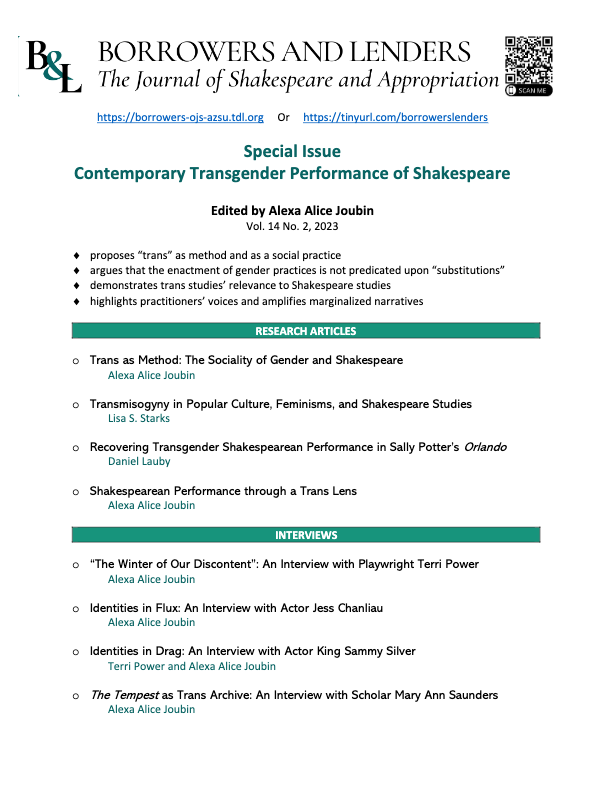Contemporary Transgender Performance of Shakespeare
Special Issue of Borrowers and Lenders: The Journal of Shakespeare and Appropriation 14.2 (2023), edited by Alexa Alice Joubin. Open Access Publication. Arizona Center for Medieval and Renaissance Studies ACMRS Press. ISSN 1554-6985
- proposes “trans” as method and as a social practice
- argues that the enactment of gender practices is not predicated upon “substitutions”
- demonstrates trans studies’ relevance to Shakespeare studies
- highlights practitioners’ voices and amplifies marginalized narratives
Cross-gender roles and performances permeate many of Shakespeare’s plays. Viola presents as pageboy Cesario for most of the dramatic action in Twelfth Night. Falstaff escapes Ford’s house as the Witch of Brainford in The Merry Wives of Windsor. Rosalind ventures into the woods as Ganymede in As You Like It. In that same comedy, Celia (as Aliena), Phoebe, and Audrey were also played by boy actors in Shakespeare’s time. In Cymbeline, British princess Imogen dresses as a male servant, Fidele, on their quest to find their husband among the Roman soldiers.
These works are in fact transgender plays. Cisgender-centric biases misunderstood them as “cross-dressing,” which implies crossing from one fixed binary position to the other. Many people are told to suspend our disbelief to understand cross-gender act.
Joubin and her contributors ask: What if the body of the female character and the actor’s somatic presence exist on a continuum rather than in contrary fixations?
The enactment of gender practices is not predicated upon “substitutions” (as in substituting the boy actor for Desdemona). It does not entail diagnostic recognition (as in being reminded of the “real” body beneath the illusion of Desdemona).
The free and open-access special issue contains research articles and interviews of actors. ::: Direct link to the open-access journal https://borrowers-ojs-azsu.tdl.org/borrowers :::: Articles also available below
RESEARCH ARTICLES |
- Trans as Method: The Sociality of Gender and Shakespeare [PDF]
Alexa Alice Joubin
- Transmisogyny in Popular Culture, Feminisms, and Shakespeare Studies
Lisa S. Starks
- Recovering Transgender Shakespearean Performance in Sally Potter’s Orlando
Daniel Lauby
Alexa Alice Joubin
INTERVIEWS |
Alexa Alice Joubin
Alexa Alice Joubin
Terri Power and Alexa Alice Joubin
Alexa Alice Joubin
